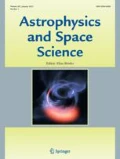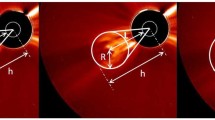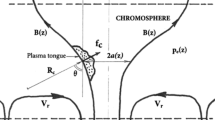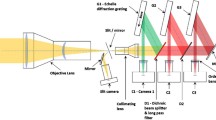Abstract
At least six intense nonthermal planetary radio emissions are known in our solar system: the auroral radio emissions from the Earth, Jupiter, Saturn, Uranus and Neptune, and the radio bursts from the Io-Jupiter flux tube. The former are thought to be driven by the solar wind flow pressure or energy flux on the magnetospheric cross-section, while the latter is a consequence of the Io-Jupiter electrodynamic interaction. Although in the solar wind, the flow ram pressure largely dominates the magnetic one, we suggest that the incident magnetic energy flux is the driving factor for all these six radio emissions, and that it can be estimated in the same way in all cases. Consequences for the possible radio emission from extrasolar planets are examined. ‘Hot Jupiters’, if they are magnetized, might possess a radio emission several orders of magnitude stronger than the Jovian one, detectable with large ground-based low-frequency arrays. On the other hand, `giants' analogous to the Io-Jupiter interaction in the form of a pair star/hot-Jupiter are unlikely to produce intense radio emissions, unless the star is very strongly magnetized.
Similar content being viewed by others
References
Acuña, M.H., Neubauer, F.M. and Ness, N.F.: 1981, J. Geophys. Res. 86, 8513-8522.
Connerney, J.E.P. et al.: 1993, Science 262, 1035-1038.
Crary, F.J.: 1997, J. Geophys. Res. 102, 37-49.
Desch, M.D.: 1983, J. Geophys. Res. 88, 6904-6910.
Desch, M.D. and Kaiser, M.L.: 1981, Nature 292, 739-741.
Desch, M.D. and Kaiser, M.L.: 1984, Nature 310, 755-757.
Farrell, W.M., Desch, M.D. and Zarka, P.: 1999, J. Geophys. Res. 104, 14025-14032.
Galopeau, P., Zarka, P. and Le Quéau, D.: 1989, J. Geophys. Res. 94, 8739-8755.
Galopeau, P., Zarka, P. and Le Quéau, D.: 1995, J. Geophys. Res.-Planets 100, 26397-26410.
Kivelson, M.G. et al.: 1998, J. Geophys. Res. 103, 19963-19972.
Louarn, P. et al.: 1998, Geophys. Res. Lett. 25, 2905-2908.
Menietti, J.D. et al.: 1998 Geophys. Res. Lett. 25, 4281-4284.
Ness, N.F. et al.: 1981 Science 212, 211-217.
Neubauer, F.M.: 1980, J. Geophys. Res. 85, 1171-1178.
Prangé, R. et al.: 1996, Nature 379, 323-325.
Pritchett, P.L.: 1986, Phys. Fluids 29, 2919.
Reiner, M.J., Kaiser, M.L. and Desch, M.D.: 2000, Geophys. Res. Lett. 27, 297-300.
Russell, C.T.: 2000, Adv. Space Res. 26 (3), 393-404.
Zarka, P.: 1992, Adv. Space Res. 12 (8), 99-115.
Zarka, P.: 1998, J. Geophys. Res. 103, 20159-20194.
Zarka, P.: 2000, Geophys. Monogr. 119, AGU, 167-178.
Zarka, P. et al.: 1997, in: H.O. Rucker et al. (eds.), Planetary Radio Emissions IV, pp. 101-127, Austrian Acad. Sci. Press, Vienna.
Zarka, P., Treumann, R.A. and Ryabov, B.P.: 2000, J. Geophys. Res., submitted.
Author information
Authors and Affiliations
Rights and permissions
About this article
Cite this article
Zarka, P., Treumann, R.A., Ryabov, B.P. et al. Magnetically-Driven Planetary Radio Emissions and Application to Extrasolar Planets. Astrophysics and Space Science 277, 293–300 (2001). https://doi.org/10.1023/A:1012221527425
Issue Date:
DOI: https://doi.org/10.1023/A:1012221527425




